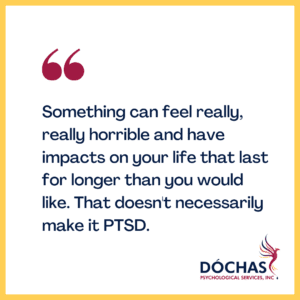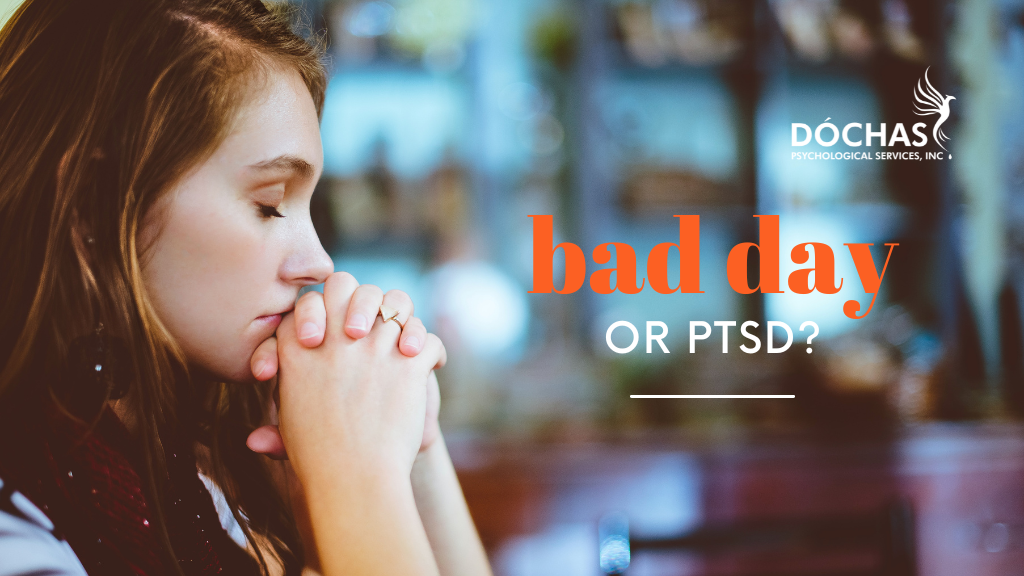One label that seems to be constant and overused nowadays is PTSD or trauma. What’s the difference between a bad day and PTSD? It’s Kim on the Dóchas blog today, and I’m going to help distinguish between trauma, PTSD, and just what’s a bad day. Because part of our job is to make sure that we aren’t over-pathologizing, which means we aren’t just giving people a label so that they have a label. We don’t want to label you with anything if you’re not actually sick and you’re just going through normal stuff.
Watch the video below or read on for more!
Defining Bad Days vs. Trauma
The first thing is to define what is a bad day vs what is trauma, and then we can define what PTSD is. So—a bad day can feel really upsetting, but it’s not going to have lasting consequences. And what I mean by that is once the bad day is over, you start fresh on the new day. The events of the day itself weren’t traumatizing because they didn’t create some sort of lasting issue that you’re then dealing with for weeks or months to come.
So that’s a bad day. In contrast, something that’s traumatizing will have a lasting impact in some way. It will either change your beliefs about the world, or it will make you way more hesitant to trust people. It might make you more jumpy for a little bit, and it kind of gets stored in your system. This means either in your thoughts or in your body or in your emotion as something that can then be set off later. You may have nightmares, or things like that.
However, just because something was traumatizing, it won’t necessarily turn into PTSD or a Trauma and Stressor-Related Disorder! This is helpful to know. Whether it does depends on what resources you have, how you’re able to overcome adversity, and what other stressors you have going on in your life. Those are all things that can impact whether or not a traumatizing event turns into something that maybe you’re going to need some additional help to work through.
So in summary, a bad day you can get over and it’s not going to impact your life long-term. Trauma might impact your life long-term, and you’re going to notice different symptoms that start to show up until you work through whatever it was that traumatized you. Now, how does that impact PTSD?
What is PTSD?
PTSD and other conditions that warrant a diagnosis have to meet certain criteria in our diagnostic “Bible,” the DSM. There are other Trauma and Stressor-Related Disorders, but PTSD seems to be one that people throw around a lot, and it gets confusing.
PTSD has to meet something called Criterion A, and Criterion A is where you have been exposed to, in some way or another, a life-threatening incident of significant physical harm. So it’s related to something that’s physical, or where you felt that physical threat in some way.
Now, it could be something that you experienced directly, or it could be something that happened to someone who is incredibly important to you, like a family member or a really close friend. It could also be something that is within society at that moment—if you’re exposed to war or things like that. All of that could meet the Criteria A. And if you don’t meet that criteria, we go no further in that diagnosis for PTSD.
This means you could still experience a traumatic event, but if it’s not life-threatening or threatening significant physical harm, it doesn’t meet the criterion for PTSD. But it could meet the criteria for other Trauma and Stressor-Related Disorders in the DSM. You might want to talk to your therapists about those!
In terms of PTSD, once you meet Criterion A, there are some other criteria:
- Time: The symptoms have to last more than one month. If they don’t last more than one month, it might be a different diagnosis.
- Intrusions: These are things like flashbacks, nightmares, and body responses to triggers. Triggers for these can be internal, like a feeling you get, or external cues like seeing a certain colour green on a tree that could remind you of where you were when the traumatic event happened. Intrusions are flashbacks, nightmares, and body responses to those triggers.
- Avoidance behaviours: This is when you’re avoiding any opportunity to be exposed to those triggers.
- Negative thoughts or mood changes: This could be thoughts like, “The world isn’t safe.” “No one can be trusted.” “I am bad.” You feel anger, guilt, shame, fear. You can’t feel positive emotions, and you’re disengaging from the world.
- Reactivity changes: You are more likely to respond angrily faster, and you’ll have angry outbursts.
- Hypervigilance: When you’re looking over your shoulder, and you’re just waiting for that shoe to drop, and you’re just really always tense. You’ll have sleep issues. You may be more easy to startle. So you become more jumpy. You have issues with concentration.
- And then the last really important thing in considering this diagnosis is it has to be causing problems in your work or social or some sort of relationship where it’s definitely affecting your ability to function in life.
The impact of PTSD, ultimately, is just that your life just isn’t working very well and people are noticing.
Why I Care About Diagnosing PTSD Correctly
As a psychologist, it’s important to me that I’m not overdiagnosing people. Something can feel really, really horrible and have impacts on your life that are lasting for longer than you would like. That doesn’t necessarily make it PTSD. It is something to look at, and it’s something to support you through and just because it’s not necessarily a clinical diagnosis, it doesn’t mean that you can’t prevent it from turning into a clinical diagnosis. You can talk to people and get support and recognize your own strengths.

And if it is PTSD, I’m still cautious with labels. Sometimes people own their label, and they think they are the PTSD. But no, the PTSD is just the illness. You are still you. We can get back to you that you really are for the most part.
If you notice that you’re struggling and some bad things happened to you, I invite you to reach out to people. Trauma happens when we get overwhelmed and our typical ways of coping don’t work. So this illness isn’t your fault. Connect yourself with some resources.
And until next time, take care of yourself. Reach out to us here at Dóchas if you need an extra helping hand with this, ok? You can reach us at 780 446 0300 or drop us a line at info@dochaspsych.com.
About Dóchas Psychological
Dóchas Psychological Services is a well-established and trusted therapy clinic located in Spruce Grove, Alberta. At Dóchas we value the idea that everyone deserves a safe space. Through connection and education, our team works hard to build a trustworthy relationship with each of our clients. It is our goal to create a community for our clients to feel like they belong.
Disclaimer
Information provided through Dóchas Psychological Services blogs or vlogs is meant for educational purposes only. They are NOT medical or mental health advice. You can read more about our disclaimer here.


